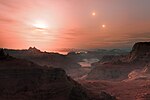케플러-32
Kepler-32| 관측 데이터 에폭 J2000 이쿼녹스 J2000 | |
|---|---|
| 별자리 | 백조자리 |
| 우측 상승 | 19h 51m 22.1742s[1] |
| 탈위임 | +46° 34′ 27.390″[1] |
| 겉보기 크기 (V) | 16.0[2] |
| 특성. | |
| 스펙트럼형 | M1V[3] |
| 아스트로메트리 | |
| 고유 운동 (μ) | RA:-13.1987±0.058mas[1]/yr Dec.:19.646±0.068[1]mas/yr |
| 시차 (π) | 3.0595 ± 0.0322[1] 마스 |
| 거리 | 1,070 ± 10 리 (327 ± 3 pc) |
| 세부 사항 | |
| 미사 | 0.58±0.05[2] M☉ |
| 반지름 | 0.53±0.04[2] R☉ |
| 표면 중력 (log g) | 4.64[3] cgs |
| 온도 | 3900±200[2] K |
| 금속성 [Fe/H] | 0.00 덱스 |
| 회전 | 36.220±0.256일[4] |
| 기타 지정 | |
| 데이터베이스 참조 | |
| 심바드 | 자료 |
| KIC | 자료 |
케플러-32는 지구로부터 약 1070광년 떨어진 시그너스 별자리에 위치한 M형 주계열성이다.케플러 우주선에 의해 2012년 1월에 발견된 [5]이 우주선은 태양 질량 0.58 ± 0.05 (),M☉ 태양 반지름 0.53 ± 0.04 (),R☉ 온도는 3900.0 K로 태양의 질량과 반지름의 절반, 온도는 3분의 2이고 광도는 5%이다.[6]
행성계
2011년, 그 주위를 돌고 있는 두 개의 행성이 발견되었고, 두 개의 행성이 더 의심되었다.[7]더 작은 케플러-32b는 5.90124일마다 모항성을 돌고 있으며, 케플러-32c는 궤도 주기가 8.7522일이다.[8]2013년 4월, 트랜짓 타임 변이 분석 결과, 3개의 다른 행성이 시스템에 있는 것으로 확인되었다.그러나, 행성의 최대 질량의 매우 느슨한 제약 조건만 결정될 수 있었다.[9]2014년, 역동적인 시뮬레이션은 케플러-32 행성계가 과거에 상당한 내부이동을 겪었을 가능성이 있는 것을 보여주었고, 가장 좁은 궤도에서 저질량 행성의 관찰된 패턴을 생성했다.[10]비록 추가적인 행성이 모항성으로부터 8.7AU 가까이 위치한다면 현재의 행성계가 불안정하겠지만,[11] 더 넓은 궤도에 있는 관측되지 않은 가스 거대 행성의 이동은 더 멀리 안쪽으로 진행되기 위해 필요할 것이다.[12]
| 동반자 (별에서 순서대로) | 미사 | 세미마조르 축 (AU) | 궤도 주기 (일) | 편심성 | 기울기 | 반지름 |
|---|---|---|---|---|---|---|
| f | — | 0.013 | 0.742956 | — | — | 0.81±0.05 R🜨 |
| e | — | 0.033 | 2.896009 | — | — | 1.5±0.1 R🜨 |
| b | 0.011M[14]J | 0.05 | 5.90124 | — | — | 2.2±0.2 R🜨 |
| c | 0.012M[14]J | 0.09 | 8.7522 | — | — | 2.0±0.2 R🜨 |
| d | — | 0.129 | 22.780806 | — | — | 2.7±0.1 R🜨 |
참조
- ^ a b c d e Brown, A. G. A.; et al. (Gaia collaboration) (August 2018). "Gaia Data Release 2: Summary of the contents and survey properties". Astronomy & Astrophysics. 616. A1. arXiv:1804.09365. Bibcode:2018A&A...616A...1G. doi:10.1051/0004-6361/201833051.이 소스에 대한 가이아 DR2 기록 VizieR.
- ^ a b c d "Notes on Kepler-32 b". Retrieved 21 January 2017.
- ^ a b c "KOI-952". SIMBAD. Centre de données astronomiques de Strasbourg. Retrieved 21 January 2017.
- ^ McQuillan, A.; Mazeh, T.; Aigrain, S. (2013). "Stellar Rotation Periods of The Kepler objects of Interest: A Dearth of Close-In Planets Around Fast Rotators". The Astrophysical Journal Letters. 775 (1). L11. arXiv:1308.1845. Bibcode:2013ApJ...775L..11M. doi:10.1088/2041-8205/775/1/L11. S2CID 118557681.
- ^ NBC. "100 billion alien planets fill our galaxy: study". NBC News. Retrieved 28 February 2013.
- ^ Swift, Jonathan J. (2012). "Characterizing the Cool KOIs IV: Kepler-32 as a prototype for the formation of compact planetary systems throughout the Galaxy". The Astrophysical Journal. 764 (1): 105. arXiv:1301.0023. Bibcode:2013ApJ...764..105S. doi:10.1088/0004-637X/764/1/105. S2CID 43750666.
- ^ Lissauer, Jack J.; Ragozzine, Darin; Fabrycky, Daniel C.; Steffen, Jason H.; Ford, Eric B.; Jenkins, Jon M.; Shporer, Avi; Holman, Matthew J.; Rowe, Jason F.; Quintana, Elisa V.; Batalha, Natalie M.; Borucki, William J.; Bryson, Stephen T.; Caldwell, Douglas A.; Carter, Joshua A.; Ciardi, David; Dunham, Edward W.; Fortney, Jonathan J.; Gautier, Iii, Thomas N.; Howell, Steve B.; Koch, David G.; Latham, David W.; Marcy, Geoffrey W.; Morehead, Robert C.; Sasselov, Dimitar (2011), "Architecture and Dynamics of Kepler 'S Candidate Multiple Transiting Planet Systems", The Astrophysical Journal Supplement Series, 197 (1): 8, arXiv:1102.0543, Bibcode:2011ApJS..197....8L, doi:10.1088/0067-0049/197/1/8, S2CID 43095783
- ^ The Extrasolar Planet Encyclopedia. "Kepler-32". Exoplanet.eu. Archived from the original on 3 February 2014. Retrieved 28 February 2013.
- ^ Fabrycky, Daniel C.; et al. (2012). "Transit Timing Observations from Kepler: IV. Confirmation of 4 Multiple Planet Systems by Simple Physical Models". The Astrophysical Journal. 750 (2): 114. arXiv:1201.5415. Bibcode:2012ApJ...750..114F. doi:10.1088/0004-637X/750/2/114. S2CID 9075167.
- ^ T. O. Hands, R. D.Alexander, W. Dehnen, 2014년 "케플러의 소형 행성계 집합체 이해"
- ^ Hands, T. O.; Alexander, R. D. (2015), "There might be giants: unseen Jupiter-mass planets as sculptors of tightly-packed planetary systems", Monthly Notices of the Royal Astronomical Society, 456 (4): 4121–4127, arXiv:1512.02649, doi:10.1093/mnras/stv2897, S2CID 55175754
- ^ Becker, Juliette C.; Adams, Fred C. (2017), "Effects of Unseen Additional Planetary Perturbers on Compact Extrasolar Planetary Systems", Monthly Notices of the Royal Astronomical Society, 468 (1): 549–563, arXiv:1702.07714, Bibcode:2017MNRAS.468..549B, doi:10.1093/mnras/stx461, S2CID 119325005
- ^ NASA Exoplanet Archive--Planet Host Overview 페이지:케플러-32
- ^ a b 쿨 KOI의 특징.IV. 케플러-32는 은하계 전체의 소형 행성계 형성을 위한 프로토타입이다.





